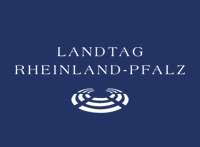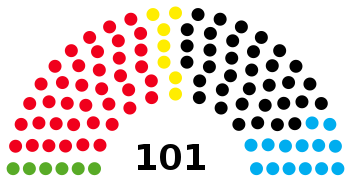Landtag of Rhineland-Palatinate
| Landtag of Rhineland-Palatinate | |
|---|---|
 | |
| Type | |
| Type | |
| Leadership | |
President | |
| Structure | |
| Seats | 101 |
 | |
Political groups |
Opposition Parties |
| Elections | |
Last election | 13 March 2016 |
| Meeting place | |
|
| |
| Deutschhaus, Mainz | |
| Website | |
| landtag.rlp.de | |
The Rhineland-Palatinate Landtag is the state diet of the German federal state of Rhineland-Palatinate.
Article 79, Section 1 of the Rhineland-Palatinate constitution provides: "The Landtag is the supreme organ of political decision-making, elected by the people. It represents the people, elects the Minister-President and confirms the cabinet, passes the laws and the budget, controls the executive and enunciates the popular will in the conduct of public affairs, in questions of European policy and according to the agreements between the Landtag and the cabinet."
The Landtag consists of 101 members.
The Landtag convenes in the Deutschhaus building, where also the first democratically elected parliament German history had convened, the Rhenish-German national convention of the Mainz Republic.
The German flag used in the Landtag is a historical one used during the Hambacher Fest.
Composition
After the elections of March 13, 2016, the composition of the Landtag is as follows:
| Party | Seats |
|---|---|
| Social Democratic Party (SPD) | 39 |
| Christian Democratic Union (CDU) | 35 |
| Alternative for Germany (AfD) | 14 |
| Free Democratic Party (FDP) | 7 |
| Alliance '90/The Greens | 6 |
Political groups in bold support the state's coalition government.
Presidents of the Landtag
- 1947 – 1948 Jakob Diel, CDU
- 1948 – 1959 August Wolters, CDU
- 1959 – 1971 Otto van Volxem, CDU
- 1971 – 1974 Johannes Baptist Rösler, CDU
- 1974 – 1985 Albrecht Martin, CDU
- 1985 – 1991 Heinz Peter Volkert, CDU
- 1991 – 2006 Christoph Grimm, SPD
- 2006 – 2016 Joachim Mertes, SPD
- since 2016 Hendrik Hering, SPD